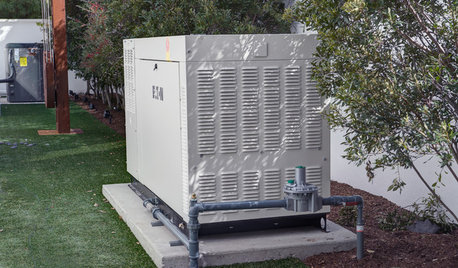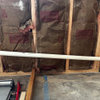hydrogen gas generation in my water heater
I have a Bradford and White water heater installed 4 months ago and it is producing a LOT of hydrogen gas. i.e. I get gas bubbles if the hot water not used for longer than half an hour. If it sits unused for a couple of days, the amount of gas released is enough to set off my explosive gas detector in the kitchen when I flush the gas out of the kitchen faucet(this is reproducible). My last task (which was an A.O. Smith) never had this problem, but years of nobody flushing out the sediment meant that it didn't have much space for hot water anymore.
The customer service with Bradford and White has been very rude. They basically are insisting that there's something in my house at fault, so I've spend hundreds of dollars and vacation time on electricians and plumbers to address what they say I have to check before they'll acknowledge anything (check grounding on pipes, check for stray voltage, replace anode with an aluminum alloy). Even the first call with them was somewhat combative even though I was asking only what I should do that that point.
Everything has checked out so far, and I'm in the process of getting the anode changed today (at my expense because the warranty doesn't cover that). The plumbers that I've talked to say that this should not be necessary on the city water that I have and that the anode rod change will likely not solve the issue. But that's being installed today as the manufacturer instructed.
Anybody have any suggestions for what I should do if this step doesn't work? All I know is that the technical support guy that I last talked to was constantly interrupting me, insisting that my house and water are the problem, not the tank and was getting belligerent enough that I basically had to tell him to calm down. He also said that some hydrogen gas production is normal, which is fine, but the volume I'm getting is beyond what I think is an acceptable limit (sets off alarm=not acceptable). I just don't know whether I'm stuck with what I think is a safety risk or whether there's something else that I can do. At this point, I don't think that if there's something wrong with the tank that Bradford and White will do anything about it other than blame something else.
Comments (42)
Related Professionals
Harmony Plumbers · Fish Hawk Handyman · North Druid Hills Kitchen & Bathroom Remodelers · University City Kitchen & Bathroom Remodelers · Plainview Kitchen & Bathroom Remodelers · Eagle Kitchen & Bathroom Remodelers · Omaha Kitchen & Bathroom Remodelers · Oxon Hill Kitchen & Bathroom Remodelers · Patterson Kitchen & Bathroom Remodelers · San Juan Capistrano Kitchen & Bathroom Remodelers · South Plainfield Kitchen & Bathroom Remodelers · Tempe Kitchen & Bathroom Remodelers · Middlesex Kitchen & Bathroom Remodelers · Phillipsburg Kitchen & Bathroom Remodelers · Mountain Top Kitchen & Bathroom Remodelerslazypup
14 years agoI would begin by having a very comprehensive water analysis. Something in the water is reacting with the metals in the water heater, and no doubt the heat is the catalyst that is causing the reaction, however the same reaction can be occurring at a lessor rate in other parts of your piping system.
Technically speaking it is some form of an elctro-chemical reaction that is causing water molecules to break down into hydrogen and oxygen, however, it has absolutely nothing to do with your household electrical supply, and the same reaction can and will occur whether its an electric, gas, oil or even a wood fired water heater. Household electricity has absolutely nothing to do with electrolysis.
jake2007
14 years agoPup,
With all due respect, I have to disagree with you.
Obviously I don't know what is causing it for sure, but certainly that amount of gas would give reason to suspect that it was being caused by electrolysis powered by the household electrical supply.Such a thing would require some extraordinary circumstances.
A test would be to vent the gas and then turn off the power to the heater. Wait and see if gas builds up over a day.
Another test would be to check for current draw while the thermostats were not closed. That test would require a meter that perhaps the OP doesn't have.
User
14 years agoI agree with Jake... I know less about plumbing than electricity but based on the OP's description, and it may be incomplete or less than accurate, this screams out electrolysis which would require electricity.
Perhaps a grounding problem, accidental or electrician made, with a difference of voltage potential between the house ground and the plumbing.
Of course, if the house is plumbed with PEX... nevermind.
lazypup
14 years agoElectrolosis does not require electricity. Electrolosys is a result of a direct current that is generated by electro-chemical reaction in the same manner as power is generated in a dry cell battery.
User
14 years agoApply an electrical current to water and you get Oxygen and Hydrogen.
Wild Bill Brooks, my HS Chemistry teacher, told me to pay attention in the 60's... it finally paid off.
lazypup
14 years agoperhaps if you had paid more attention to the chemistry teacher you would have noted that he said applied direct current electricity you break the H2O molecule into its two basic components Hydrogen & water, but household electric is Alternating current,
User
14 years ago"Perhaps if you had paid more attention to the chemistry teacher you would have noted that he said applied direct current electricity you break the H2O molecule into its two basic components hydrogen & water, but household electric is alternating current".
The two elements of water are oxygen and hydrogen not hydrogen and water.
Difference in ground potential can do many bad things like get you electrocuted.
I'll never argue with the pup about plumbing but he is out of phase and his polarity is reversed on this electrical subject and there was no reason for the wise a$$ remark.
jakethewonderdog
14 years agoYep, let's not get personal here.
Pup, I had lots of fun with splitting water as a kid. It's by the grace of God that I'm still here to tell about it. That and my 165 gal methane generator that I made in high school... Anyway, AC will do it too - it's just that your hydrogen and oxygen aren't kept separate then.
Look, I'm not convinced that it's electrolysis. What we know from the OP is that it's a lot of gas, it's setting off his gas detector and it started when the water heater was installed.
I know that there are other possible sources- but those wouldn't generate the volume of gas.
OP: try what I suggested - vent the gas, turn off the heater at the breaker and see if the problem continues. It's not a definitive test, but it's a start.
maryland_irisman
14 years agoI'm impressed with the courtesy you guys exhibit, it's refreshing.
I honestly think lazypup did mean oxygen and hydrogen and typed "water" in haste.
There are many ways to generate hydrogen from water. The OP mentioned a lot of sediment in the old heater. I wonder if there is also bacteria? Just a thought.
Here's a site the OP might want to browse to see if one of these might apply to their situation.
cattoecounter
Original Author14 years agoThanks for all the feedback!
Unfortunately the plumbers came shortly after I posted, so I wasn't able to try turning off the power to the water heater before they changed out the original magnesium anode to an aluminum alloy one. The one that they pulled out was almost completely used after 4 1/2 months! So far, I haven't noticed much gas with the new one, but on the weekend with me home more, it's not likely to be as noticeable. Maybe I'll notice something during the work week. A friend who was looking after my house while I was out of town did turn off my heater and furnace when the gas alarm went off on her, so I can ask her if she noticed less air bubbles after she did that.
I didn't notice a rotten egg smell -- it was setting off my explosive gas detector (which I really got just in case of a natural gas leak, but I appreciate it warning me that the "air bubbles" coming out of the hot water tank weren't just air.).
Here's some more info about the tank/situation:
It was a gas water heater with power venting. The previous water tank was ~14 years old and I did not experience any air bubbles with that tank (although the anode was likely all used up).I did a burn test on the "air bubbles" after the gas alarm started going off and the bubbles did burn. So I'm pretty sure that I was having some form of electrolysis going on in the tank. There are no air bubbles with the cold water. The tech support guy tried arguing with me that hydrogen gas production is normal, even what I was getting. It is a product of the reaction at the anode, but I got 10 years worth of gas production in 4.5 months and that just doesn't seem safe to me at all.
I don't have a water softener in my house to contribute to the problem and I'm on city water. The plumbers who came had over 20 and 12 years experience and they hadn't seen anything like what I was experiencing in our area (especially on city water). They also checked out the water tank installation and the plumbing in the basement and everything seemed fine.
So, right now it seems like the new anode might have resolved the hydrogen gas production problem. Do you think that I'm "lucky" and the old anode was bad or could changing from a magnesium anode to a aluminum alloy one hide the problem as the aluminum alloy supposedly produces less gas? In other words, does my tank likely still has something wrong with it that switching the anode is just hiding or delaying? I'd hate to have the anode change basically postpone a tank failure rather than have it fixed or replaced under full warranty. Labor is only paid for the first year and then the tank itself is covered for 6... but then I'm not sure that they wouldn't find something else to blame to get out of covering the problem. Interacting with their tech support was seriously the worst customer service that I have ever experienced.
jake2007
14 years agoThat's helpful information. At this point, I would get the water analysis done as someone suggested early on. I'm now shying away from the thought that it is being caused by household electrical current.
User
14 years agoWith the information in your last post this begins to make sense.
Rotten egg smell is usually indicative of hydrogen sulfide (H2S) not hydrogen. There can be things in the water that react with the anode rod to create that gas. Sometimes changing to a different composition anode rod solves the problem and sometimes not.
Make sure the temp setting on your water heater is above 140 degrees eliminating the possibility of bacteria in the WH.
If you didn't mention rotten egg smell to the Bradford-White people give them a break. When you don't provide concise symptoms it's very difficult for anyone to diagnose long distance. No one can smell or see over the phone.
water_daddy
14 years agoI concur with justalurker...hydrogen sulfide (H2S) commonly forms in water heaters and can be a bio-chemsitry problem. Get rid of the sulfur-reducing bacteria and the odor will go away. Trying flushing minerals and corrosion from the tank and rasing the heat to at least 140F for a few hours.....usually does the trick.
Splitting water molecules is highly unlikely and requires tremendous energy to break the colvalent bonds. If you had hydrogen gas you also have oxygen and when these gases are compounded that's one nasty bomb.....fortunately there is no record of this ever happening in a water heater.
jakethewonderdog
14 years ago"I didn't notice a rotten egg smell"
I'm not clear - was there a rotten egg smell or not?
As others have stated, rotten egg smell is sulfur and is often caused by bacteria in this situation.
scottmcplumber
14 years agoFollowing up on "water daddy" be sure to remember turn the tank back down to between 120-140 degrees after a few hours. Leaving your tank at high temps too long can cause a number of problems (scalding skin, etc.). Temps above 120F keep bacteria (i.e. legionella) at bay. Hydrogen gas can also build in the gas fired tank if temperature is set too high, along with high water pressure and thermal expansion occurring together. Heating and compressing the water. Note: 3 plumbers in Pittsburgh almost lost their lives when doing demolition work in a restaurant and this situation was present. The hydrogen gas was released and combusted. Any time a HWT is left unused, under pressure and heating, hydrogen gas will build up in the plumbing system. By the way, to check hot water temp. use a meat thermometer. Hold it for about two minutes under kitchen sink flow, hot water on only, of course.
cattoecounter
Original Author14 years agoYes, I think a couple of you misread my followup post. I do not have any whiff of a rotten egg smell at all.
I agree that if I had omitted something like that to tech support that would be bad. But I didn't -- I gave the all the information I had, including the results from the electrician and the plumbers. My biggest gripe with the service that I had was that they immediately said that "it's not our tank that's the problem" and started blaming everything else. When I questioned why it a house problem would show up when the only thing that changed was the water heater, they got nasty. I was rather shocked by their response. I've gotten better feedback and suggestions of things to check here than I got with them.
I did check my water heater temp - it's a tad over 120 degrees with my meat thermometer, so I could turn it up a little just to be safe bacteria-wise.
And... it looks like I might still be having some gas generation, although a lot less. I might actually have to try turning off the electrical power to the tank to see whether the gas generation stops.
jakethewonderdog
14 years agocattoecounter,
My guess that it could be electrical has gone down in probability since it is a gas powervent unit, not electric and changing the anode reduced part of the problem.
However, if you are going to try turning off the power, if you can, kill the power to the entire house (main breaker). It would take some really unusual circumstances to cause electrolysis powered by household current-- but if we are going to rule it out, let's rule it out completely.
water_daddy
14 years agoHave you actually measured H2 gas? LEL readings? What are the reported values you are detecting?
stan_in_pa
14 years agoWater Daddy, it would seem that requesting H2 & LEL values isn't needed, the OP noted that the bubbles burn. Unscientific, but useful information.
The electrolysis mentions in numerous posts need a bit of clarification. Yes, you use DC in science class to conduct electrolysis experiments. When you do that you get H2 on one electrode and O2 on the other. When electrolysis is occurring with an AC power source you get both gasses released at both electrodes.
Even though bubbles of both gasses are being bled out of the faucet together, and explosion in the heater is unlikely, since even though there is fuel and oxygen present, there is no heat of combustion.
If there is a ground fault in any part of the heater which is causing stray AC line current to be conducted into the water, that will constitute one of the electrolysis electrodes. The other electrode will be any grounded metal pipe anywhere in the entire plumbing layout of the house. If this is actually the case, there is also electrolysis occurring at the grounded metal pipe location too.
A way to test for failed insulation in the heater follows: 1-Turn off the circuit breaker which supplies power to the heater.
2-Disconnect the neutral (white) wire from the heater where it connects into the neutral bus bar inside the breaker panel.
3-Disconnect the green (or bare) ground wire, either inside the junction box on the heater, or in the breaker panel.
4-Assure that neither the neutral or ground wires are contacting any metallic conductors.
5-Run enough water from the hot tap to cause the thermostat in the hot water hater to activate.
6-Using a multimeter, check for both stray AC and DC voltages with one test lead on the load terminal of the breaker and the other on the ground bus in the breaker panel.
7-Switch the multimeter to an ohm scale (if its analog, go to an Rx100 or Rx1k scale and check for continuity at the same points as step 6.Voltage levels in excess of 10-15 volts in step 6 suggest stray current being impressed onto water plumbing somewhere external to the heater.
Electrical continuity found in step 7 indicates compromised insulation in electrical components in the heater. Show this to your plumber.
As an aside, I am neither a plumber or electrician, although I do all of what both of these professions do and then some. However for a problem like yours, an electrician is an electrician. A plumber on the other hand has skills crossing into several other trade areas, and most plumbers, particularly HVAC technicians, have to be pretty sharp about electricity to make it in todays technical environment.
If you don't feel comfortable attempting the tests described above, print it out and request your plumber do the tests for you.
water_daddy
14 years agoStan my man, hydrogen gas production is conceivable but so are many other flammable gases that are more likely to form. Your advice may be good, but what if it's not H2? My question was valid.
jake2007
14 years agoStan,
Your thinking was along the same lines as mine. However, the likelihood that it's electrical goes way down because it's not an electric water heater - it's a powervent. It still is connected to power, but it would require multiple failures and I can't quite construct the scenario in my head.
This is an odd one, but the things I can think of in order of probability are:
1. Bacterial reaction or chemical reaction to the anode.
2. Gas is present in the water supply but is showing up in the hot water because of the way that a hot water tank will separate gas from the water (the gas collects at the top where the hot water outlet is).
3. Something else not mentioned yet
4. Electrolysis resulting from current from the household power supply.allegro
14 years agoI HAVE THE SAME PROBLEM!!! My new Bradford & White heater is PROPANE. Only electric source is the ground wire on the water pipe above the tank. B&W Tech says it is aggressive water or poor grounding. Like Cattoecounter, I was told to have an aluminum anode installed. Why should I have to go through this nightmare? My old water heater did not have this problem. Plumbing Supplier and installer do not know what to do! HELP...973-451-2666
ljjmpav_ptd_net
12 years agoSame issue, After 5 years my GE electric water heater tank split, Before this, no problem. I replaced it with a Bradford White 50 gal, for the first 8 months I noticed gas purging from my hot water faucet, not a lot but, enough to get my goat and find the source. One day it stopped just like that however, I began to get rusty hot water the steel anode rod core was rusting once exposed. So after a chat with Bradford White they suggested replacing the whats left of the magnesium anode with an aluminum (on me). So we will see, I also mentioned removing the anode rod altogether which will void the warranty and being my next move if the aluminum anode causes any problems. Then on to a new water heater and the obvious choice isn't the common denominator Bradford White.
Gary808
12 years agoHere again, I would suggest checking to make sure that the cold and hot water connections to the hot water heater have plastic insulators in them to assure there is no electrical contact to ground.That is, through the plumbing system.
brickeyee
12 years agoSwitching to an aluminum rod usually solves the problem.
And it is "on you" since it is YOUR water that is not compatible with the equipment purchased.
It is pretty rare to get hydrogen from simple electrolytic corrosion from mismatched metals.
The energy level from the 'battery' you created is not high enough to break down water.Even a single battery cell is rarely high enough voltage.
In the lab 9-12 volts DC is used, but this can be lowered to 2-3 volts with carefully chosen electrolytes.
Deionized water is very pure and is a decent insulator.
Bob17
11 years agoCatoecounter,
You are absolutely correct and so is Bradford and White. It IS hydrogen gas that your heater is generating. I had the very same problem. B & W tech was very pleasant to me and advised that I change my magnesium rod to an aluminum one. After I did I no longer had the "gas" problem. To help protect your tank more, he suggested that I run a #6 copper wire between the hot and cold pipes fairly close to the heater and to be sure that your cold water line is properly grounded. Oh, you do not need electricity to have electrolysis. If you don't believe me, check your car battery! Good luck!User
11 years agoI think A1 Plumbing of Baltimore hires folks that either:
A) Can't read, or
B) Are thieves.You don't get to attempt to steal advertising space on this site. By doing so, I have to assume you are incapable of reading the site TOU or that you don't care. Either way, were I in the Baltimore area, I would not hire a plumber who is either uneducated or dishonest.
You asked.
Cindy Graber
4 years agoIn the last three months I had two Bradford and white 50 gal tanks installed. One worked perfectly the second was a lemon from the moment it was installed. I too experienced the bubbles and the gases. Had the plumbers come five times to work on it. They were saints. Bradford was pretty much denying any problem with the tank. My electrician happened to be out my house while the plumber was troubleshooting with Bradford and eliminated all concerns about voltage and electrical problem. Bradford insisted the next step was an aluminum anode. The plumbers installed the new one and it was unbelievable the corrosion on the old one within three months. The problem still existed after the new anode was installed. Let me remind you I had two installed one worked great the other from the beginning produced bubbles and spurts. I pretty much had to be very hard core with my plumber to get my lemon replaced. It took five visits and a lot of labor on the plumber side to finally get a new water heater. Day two everything works great. This is my third heater in 25 years. Never have ever had this kind of problem with a heater. I personally feel that it is a product liability problem. Possible a compromised insulation with the electrical components in the heater
David Mingle
3 years agoHow do you know it's hydrogen gas? Nothing in your water heater should be able to produce hydrogen. Electrolysis is done by electric current running between conductive plates underwater water that is rich in electrolyte. Also it's hard to believe even with air alone your system isn't being airlocked ....
Miguel Vargas
3 years agolast modified: 3 years agoWhy should we let it die when it is still a problem? I have a new Bradford White 50 gallon gas heater with the same issue. The fact that this is a 10 year old post means that B&W has failed to address the problem for so long that it could legally be considered neglect.
Cindy Graber
3 years agoI agree have had the same problem made the plumber replace a brand new water heater. Spent six months back and forth with the plumber I think they have a lot of lemons out there. I will never put another Bradford in my house
HU-773919417
3 years agoWe’re having the she issue with BradFord water heater. After it was installed, we are getting constant air bubbles and sputtering from the hot water side. .
hopefully they replace the water heater by Monday. seems to be a hydrogen gas issue caused by the anode rode(?)HU-556795458
3 years agoInstalled a 50 gal, Bradford & White, gas-fired water heater last month. Had considerable gas in hot water lines and could not eliminate by purging. Would reoccur after several hours. Today confirmed that the generated gas is flammable. Satisfied that the origin of the hydrogen may be ascribed to the magnesium anode used for corrosion protection. Plumber has ordered replacement aluminum anode rods from B&W which we expect to resolve the gas generation issue. Mg is a much more electroactive metal than Al ... hence this issue. More pronounced with soft water. (We use city water from a surface source ... not a well.)
Miguel Vargas
3 years agolast modified: 3 years agoI had the same issue, here's a video of me lighting the gas on fire https://www.youtube.com/watch?v=lju7t6CjUTQ
I can report that the problem went away when the magnesium anode rod was replaced with an aluminum one.
Nena Pratt
3 years agoBought a new home in Nov '20. Noticed air bursts at kitchen sink prior to closing & at walk through the day of closing. Put on punch out list for builder to address & correct the air in water lines. Plumber replaced the anode rod 1st of Feb '21. Reduced air bursts in hot water lines for abour 7 days. Did the fire test & air ignites into a fire ball as air bursts from the hot water faucet in our master bathtub.
We have well water.
Water tested this past week & has high salt level, 1,740 TDS.
We have a water softener.
Water heater is a Bradford White!
Very concerned for the safety of my family. Any suggestions on what is needed to be done to eliminate the Hydrogen gas.
Whole house RO system & a different brand of water heater? Rheem or AOSmith water heater?Chuck Knight
2 years agoYou have a shorted heating element replace them both and replace the sacrif rod
Correo Sim
2 years agoIf you have Hydrogen gas it will pop or produce a small explosion with a blue flame when ignited, I use to play with electrolysis bubbles when I was a kid.


















manhattan42